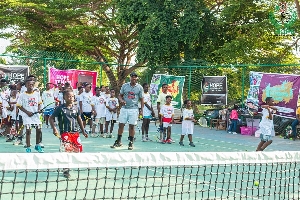In recent years, the power of sports to drive social change and foster development has gained widespread recognition in Ghana. Sports foundations and non-governmental organizations (NGOs) dedicated to sports for development have emerged as key players in this arena, leveraging the universal appeal of sports to address pressing social issues.
However, while many of these organizations start as passion projects driven by a single individual, it is crucial for them to evolve and implement robust systems, structures, and governance practices to ensure their long-term viability and impact.
As someone who has been approached by numerous sports NGOs seeking assistance in grant writing, particularly for initiatives like the recent Adidas Foundation call for applications (https://www.adidasfoundation.org/get-involved ), I have observed a common trend among these organizations. Many of them operate as one-man shows, lacking proper staffing, financial management systems, and governance structures.
The founder often wields supreme power and authority, leading to potential issues of transparency, accountability, and procedural fairness.
It is imperative for sports NGOs to recognize that to effectively advance their missions and scale their impact, they must adhere to the principles of transparency, accountability, good governance, and safeguarding. Here are some key considerations for effective management and sustainability:
1. Establish Systems and Structures: As organizations grow, it becomes essential to establish clear organizational structures, roles, and responsibilities. This includes hiring qualified staff, defining job descriptions, and implementing proper reporting mechanisms. Creating an organizational chart and establishing policies and procedures can help streamline operations and ensure accountability.
2. Financial Management: Implementing sound financial management practices is crucial for the sustainability of sports NGOs. This includes maintaining accurate financial records, budgeting effectively, and ensuring compliance with financial regulations. Proper accounting systems and regular financial reporting are essential for transparency and accountability.
3. Governance and Decision-Making: Effective governance structures are essential for ensuring that decisions are made transparently and in the best interests of the organization and its stakeholders. Establishing a board of directors or advisory board can provide oversight and guidance, while also ensuring a diversity of perspectives in decision-making processes. Additionally, adopting democratic decision-making processes and clear conflict-of-interest policies can help prevent conflicts and promote fairness.
4. Staffing and Human Resources: Properly managing human resources is critical for the success of sports NGOs. This includes fair and equitable employment practices, providing staff with training and professional development opportunities, and ensuring a safe and supportive work environment. Fair compensation and benefits are also essential for attracting and retaining qualified staff.
5. Safeguarding: Protecting the well-being of participants, staff, and volunteers should be a top priority for sports NGOs. Implementing safeguarding policies and procedures, conducting background checks on staff and volunteers, and providing training on child protection and safeguarding can help prevent and respond to incidents of harm or abuse.
By prioritizing these principles and implementing robust systems and structures, sports NGOs can enhance their effectiveness, credibility, and sustainability. While the journey towards good governance may require time and resources, the long-term benefits for the organization and the communities it serves are invaluable.
As the sports for development sector continues to grow and attract funding opportunities, it is essential for organizations to embrace good governance practices to maximize their impact and ensure a lasting legacy beyond the founder's tenure.
The writer, Cedric Dzelu is the Vice President of the Ghana Tennis Federation
cedricdzelu@gmail.com
Opinions of Thursday, 4 April 2024
Columnist: Cedric Dzelu















